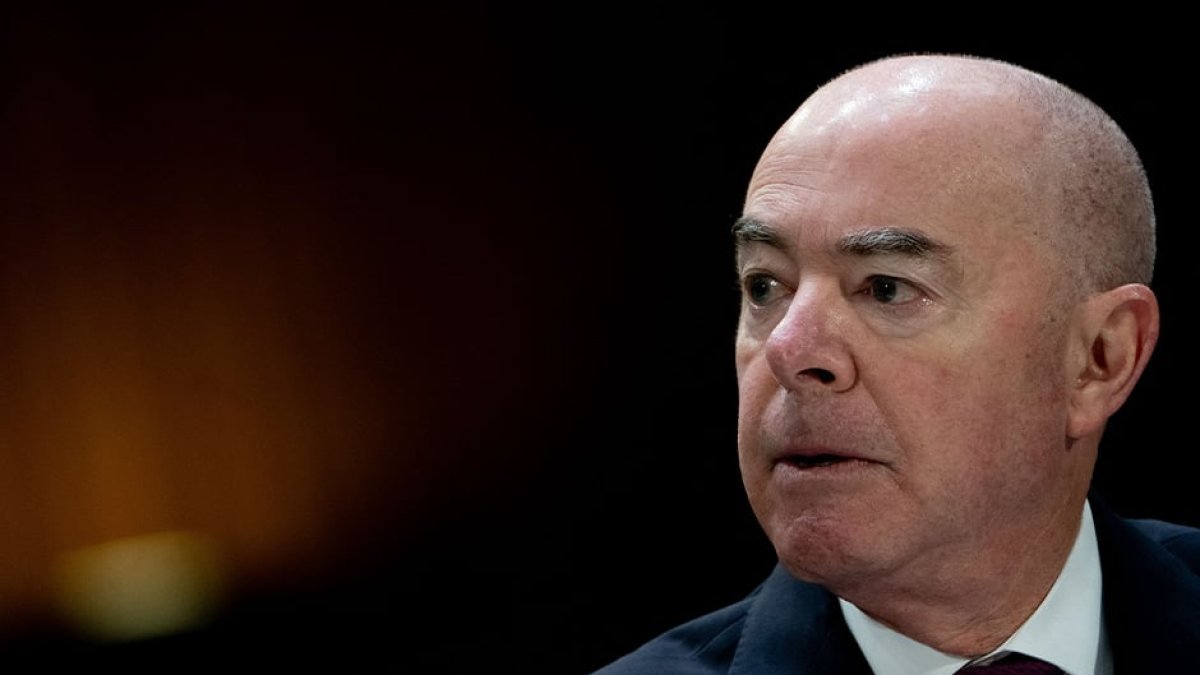Unprecedented: Democrats kill Mayorkas impeachment articles without even holding a trial
This is the first time in the country's history that the House approves an impeachment and the Senate refuses to carry it out.

(Stefani Reynolds / AFP)
Ignoring the Constitution and creating a disastrous precedent, Senate Democrats have decided not to hold the impeachment trial against Alejandro Mayorkas. What Democratic Majority Leader Chuck Schumer did has never happened in the history of this country. The Senate held trials in all cases in which the House voted in favor of impeachment. Democrats are so afraid of Americans seeing the evidence against Mayorkas that they prefer to change the way the Senate works.
Since President Joe Biden took office in January 2021, more than 10 million immigrants have entered the country illegally, which is the highest number of illegal crossings in history. At these levels, the immigration crisis affects not only the border states but the entire country. Polls show that for millions of Americans, migration is the main problem that concerns them. Given the size of the crisis and what many Republicans have described as a systematic violation of immigration laws, the House of Representatives approved the impeachment against Mayorkas in mid-February.
This Tuesday, House Republicans sent the articles of impeachment to the Senate. If Democrats, who have a majority in the Senate, acted according to the rules, they would have executed one of the two options provided by the laws regarding this procedure. The first is to hold Mayorkas' trial in the Senate plenary session. The second option is to appoint a committee, which would be composed of an equal number of Democrats and Republicans, carry out the trial in that committee, and in the end receive the votes of all the Senators. Although the trial does not take place in the Senate plenary session, it is made public and requires all members' votes.
Quick and silent
However, Schumer decided to avoid the trial after a motion passed only with a simple majority. Last week, the Democrat clearly intended to end the impeachment process quickly and quietly. "We want to address this issue as expeditiously as possible," the Democrat said while waiting for the House to deliver the articles to the Senate. The impeachment of a member of the government cabinet is a big deal. It has only happened twice in the country's history, and it has never happened that after the House voted to impeach someone, the Senate ruled out holding the trial. This is a great event.
Schumer has two main reasons for breaking the rules and creating a disastrous precedent. The first is that he does not want to hold a trial in which all the evidence that the House Republicans have collected regarding the actions of Secretary Mayorkas and the Biden administration on immigration matters is presented to the Americans. The second has to do with the fact that holding a trial would mean exposing Democratic senators, in an election year, to publicly issuing their evaluation of Secretary Mayorkas' work. Schumer doesn't want Americans to see the senators who will be on the November ballot, and who are fighting hard for theirs seats, declaring Mayorkas "not guilty."
In a year in which Democrats stand to lose their Senate majority, Schumer did what was necessary so that millions of Americans would not see Senator Sherrod Brown of Ohio declare Mayorkas "not guilty." Brown is playing the political battle of his life this November, and like him, other Democratic senators do not want to expose themselves by casting a vote in defense of Mayorkas, which could possibly cause them to lose voters. Bob Casey of Pennsylvania, Tammy Baldwin of Wisconsin, and Jacklyn Rosen of Nevada are senators fighting for their seats amid very tight races. That is why the Democrats quickly and quietly dismissed the Mayorkas trial.
What is going to happen to the impeachment processes from now on?
When Trump was first impeached, the House of Representatives, controlled by Democrats at the time, approved the articles in December 2019. In February, the trial was held in the Senate. By that time the Republicans had a majority in the Senate, they could have acted as Schumer does today, scrapping the prosecution. However, Republican senators understood that, as has always been done in the history of this country, once the House has approved the impeachment, they had the obligation to hold the trial. So, obeying their constitutional duties, they held the hearing, and Trump was acquitted after the vote.
The actions of the Democrats in avoiding the trial against Secretary Mayorkas set a precedent that will change the future of impeachment processes. From now on, it will be very difficult for the Senate to carry out trials when the accused is part of the party that controls the Senate. In the hypothetical but probable scenario, that in November the Republicans regain the Senate but lose the House, and Donald Trump is elected president, the Democrats will likely try again to impeach the Republican. If they approve it in the House, would Democrats expect a Republican Senate not to avoid the trial as they are now doing with Mayorkas?
Quite rightly, House Speaker Mike Johnson said last week: "To table articles of impeachment without ever hearing a single argument or reviewing a piece of evidence would be a violation of our constitutional order and an affront to the American people whom we all serve."

























